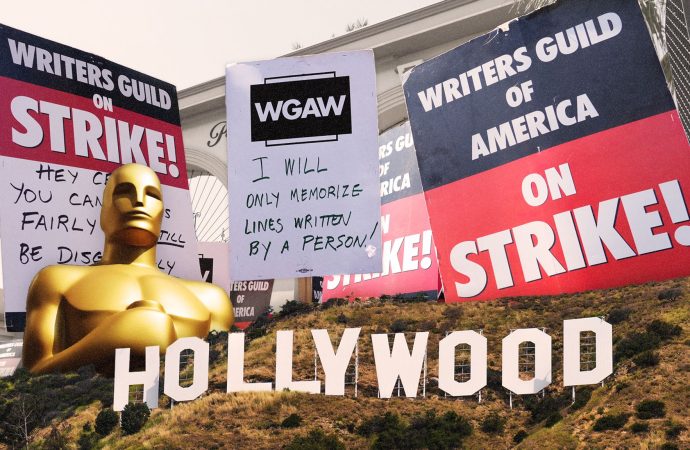Introduction The Writers’ Strike of 2023-2024 brought Hollywood to a standstill, with writers demanding fair compensation and protections against the rapid advancement of artificial intelligence (AI) in screenwriting. This strike not only disrupted productions but also shed light on broader labor issues in the entertainment industry. The strike’s resolution left an undeniable impact on Hollywood,
Introduction
The Writers’ Strike of 2023-2024 brought Hollywood to a standstill, with writers demanding fair compensation and protections against the rapid advancement of artificial intelligence (AI) in screenwriting. This strike not only disrupted productions but also shed light on broader labor issues in the entertainment industry. The strike’s resolution left an undeniable impact on Hollywood, reshaping the landscape of content creation and labor rights in lasting ways.
Rise of the Writers’ Strike
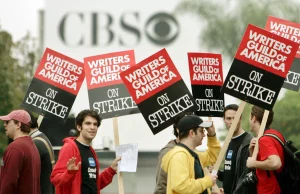
Image by: Yandex.com
The Writers’ Strike of 2023-2024 didn’t happen overnight. Writers felt ignored and undervalued, especially with the growth of streaming services that changed how people watch movies and TV shows. The Writers weren’t receiving fair pay for their work on these platforms, and new technology, like AI, threatened their jobs. Writers decided to take action, pushing for fair treatment, better pay, and job security. This strike became their way of standing up for their rights and protecting the future of their work.
Background of the Writers’ Strike
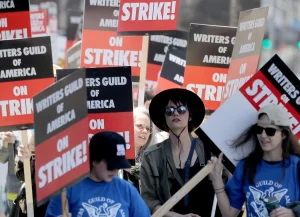
Image by: Yandex.com
The Writers’ Strike began in May 2023 when members of the Writers Guild of America (WGA) halted work, rallying for better wages and safeguards against AI encroachment in their work. Their demands reflected concerns over streaming revenue distribution, job security, and the evolving role of technology in writing. Studios, on the other hand, resisted, arguing that the industry’s financial structure could not meet these demands without significant changes. The impasse marked one of the most significant labor disputes Hollywood had seen in decades.
Core Issues and Demands
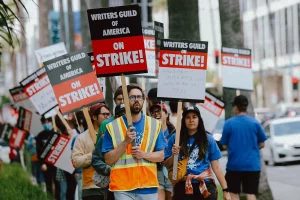
Image by: Yandex.com
The key issues in the strike centered around three primary demands:
- Fair Compensation: Writers demanded an increase in wages, particularly for work distributed on streaming platforms, where revenue models differ significantly from traditional media.
- Job Security and AI Protections: With AI’s growing capabilities in scriptwriting, writers wanted assurances that they would not be replaced or have their work generated by AI without compensation.
- Improved Working Conditions: Writers sought a reduction in “mini rooms” (small writing teams used to develop ideas before full production), which often resulted in lower pay and increased workloads.
Benefits Achieved Through the Strike
The strike led to several positive changes for writers. One big win was fairer pay for work on streaming services, which had previously paid writers less than traditional TV. The new agreement also added protections against AI replacing writers, meaning that AI could only be used to help writers, not replace them. These changes mean that writers now have more financial security and better protection for their creative roles.
Role of AI in Hollywood Writing
AI was a major concern during the strike. Writers worried that AI could take over writing jobs, which would reduce the need for human creativity. The new agreement allows AI to be a tool for writers, but it cannot replace them. For example, AI might help with ideas, but human writers must lead the storytelling. This rule helps protect writers’ jobs while allowing some use of technology to support creative work.
Writers’ Strike: Outcome and Lasting Impact on Hollywood
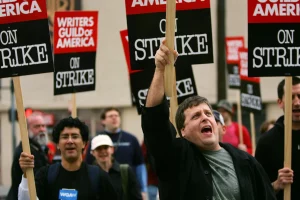
Image by: Yandex.com
The Writers’ Strike of 2023-2024 was a major event that changed Hollywood. Writers stopped working to demand fair pay, better working conditions, and protection from AI taking over their jobs. For several months, movies and TV shows couldn’t continue as planned, affecting studios, actors, and fans. This strike wasn’t just about pay; it was about protecting creative jobs in a time of rapid change in technology and media.
Why Writers Felt They Needed the Strike
Writers in Hollywood felt that their work wasn’t valued enough, especially with the rise of streaming services. These services changed how people watch movies and shows, but writers weren’t getting a fair share of the money. Writers also worried about AI replacing them. They didn’t want machines to take over their creative work. The strike was their way of saying they deserve respect, fair pay, and job security.
The Agreement That Ended the Strike
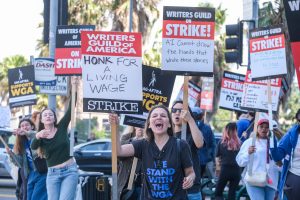
Image by: Yandex.com
After months of discussions, the Writers Guild of America (WGA) and the major studios reached an agreement. This deal gave writers higher pay for streaming shows and movies. It also included important protections against AI. Under the new rules, AI can only assist writers but not replace them. This was a big win for writers, as it means studios must keep hiring real people for creative work. Another positive change was the commitment to reduce mini rooms and set minimum staffing levels, which means writers will have more stable jobs.
The Strike’s Resolution and Immediate Outcomes
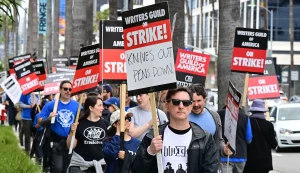
Image by: Yandex.com
In late 2024, after months of halted productions, the WGA and major studios reached an agreement. The key points in the settlement included:
- Increased Residuals: Writers received a significant increase in residuals, especially for content on streaming platforms, addressing the disparity between traditional and new media.
- AI Regulation: The deal established rules limiting AI’s role in screenwriting, ensuring it could only be used as a tool, not a replacement for human writers.
- Commitments to Job Stability: The agreement set limits on the use of mini rooms and mandated minimum staffing requirements, securing more jobs for writers.
Long-Term Implications for Hollywood
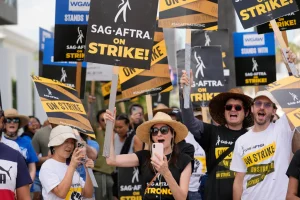
Image by: Yandex.com
The strike’s outcome has reshaped Hollywood in ways that are likely to be felt for years:
- AI as a Tool, Not a Replacement: The agreement introduced limits on how AI can be used in script development. Writers now have assurances that AI won’t replace their creative input, though it may be used to aid in brainstorming and idea generation.
- Reevaluating Revenue Models: The agreement highlighted the need to rethink how streaming revenue is shared. Studios may need to shift their models to reflect fairer compensation structures in response to increasing union demands.
- Rise of Collective Bargaining Power: The success of the WGA in securing its demands may encourage other guilds and unions to advocate for similar protections and rights, potentially leading to more organized labor efforts across Hollywood.
How the Strike Could Inspire Other Workers
The success of the Writers’ Strike might encourage other workers in Hollywood to stand up for fair treatment. Writers showed that they could make a difference by working together, and this might inspire actors, directors, and other creative workers to push for their rights too. Unions across Hollywood are now paying attention, and they may seek better deals for their members as well. This could lead to more positive changes in how people are treated across the entertainment industry.
A New Era for Hollywood

Image by: Yandex.com
The Writers’ Strike has brought lasting changes to Hollywood. The industry is now more focused on fair treatment, better pay, and responsible use of new technology like AI. Studios may also need to adjust how they pay other creative workers to keep up with these changes. The strike has opened the door to a fairer, more respectful environment in Hollywood. As the entertainment world continues to evolve, the lessons from this strike will likely shape its future for many years.
Challenges Faced by Writers During the Strike
The strike wasn’t easy for writers. During this time, they had no income from their regular work, and many projects were put on hold, affecting everyone in Hollywood. Writers had to stay united and committed to their goals, even when it was tough. The studios also faced challenges, as they lost time and money while productions were delayed. However, writers felt these sacrifices were necessary to secure fairer treatment in the future.
Future of Hollywood After the Strike
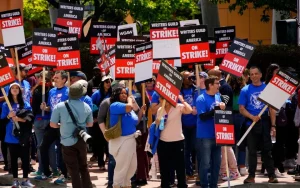
Image by: Yandex.com
The Writers’ Strike has created a new direction for Hollywood. The success of the strike has shown other creative workers that change is possible. Writers hope that their efforts will lead to fairer treatment for all workers in the entertainment industry, not just for themselves. Hollywood may see more efforts to improve working conditions, fair pay, and responsible use of technology. The strike has set a new standard, and its effects are likely to shape the industry for years to come.
Comparative Analysis: Pre-Strike and Post-Strike Hollywood
| Aspect | Pre-Strike Hollywood | Post-Strike Hollywood |
|---|---|---|
| AI Role in Writing | Limited regulation, AI experimentation | AI used as an aid, not a replacement, with established rules |
| Writer Compensation | Streaming residuals were minimal | Significant increase in residuals, fairer distribution |
| Mini Rooms | Widespread, often low-paying | Restricted usage, minimum staffing requirements |
| Union Influence | Limited leverage in negotiations | Strengthened bargaining power, precedent for other unions |
Outcome Analysis: The Future of Hollywood After the Strike
| Key Change | Short-Term Outcome | Long-Term Impact |
|---|---|---|
| AI in Screenwriting | Limited role in immediate production stages | Continued monitoring and regulation |
| Streaming Compensation | Fairer pay model for streaming residuals | Potential overhaul of revenue-sharing models |
| Union Solidarity | WGA succeeded in setting new labor standards | Increased unionization across entertainment sectors |
| Industry Innovation | Temporary delays in production due to strike | Potential for more writer-driven content development |
Conclusion: A New Era in Hollywood
The Writers’ Strike of 2023-2024 has set a powerful precedent in Hollywood, proving that collective action can secure meaningful change. The impact of this strike extends beyond writers to all creative professionals, showcasing the importance of fair labor practices in a rapidly evolving industry. By establishing protections around AI, residuals, and working conditions, the strike has redefined the standards for Hollywood’s future, likely inspiring further movements in creative fields worldwide.

